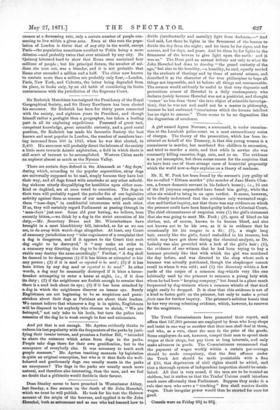Mr. E. W. rook has been found by the coroner's
jury guilty of the so-called " Eltham murder" (the murder of Jane Maria Clon- sen, a former domestic servant in his father's house) ; i.e., 16 out of the 22 jurymen empanelled have found him guilty, while the other six wished to bring in an open verdict. It seems, however, to be clearly understood that the evidence only warranted suspi- cion and further inquiry, not that there was any evidence on which the prisoner could have been found guilty before a Criminal Court. The chief circumstances of suspicion were (1) the girl's statement that she was going to meet Mr. Pook ; (2), spots of blood on his clothes, not, of course, known to be human blood, and also not known not to be his own, as it is in evidence that he occasionally bit his tongue in a fit ; (3), a single long hair, exactly like the girl's, found embedded in his trousers, but which may have got there during the chemical analysis, as Dr. Letheby was also provided with a lock of the girl's hair ; (4), the evidence of one witness that he had been trying to buy a hammer precisely like that with which the girl was murdered the day before, and was directed to the shop where such a hammer was actually purchased, though the shopkeeper cannot recall to whom it was sold ; and (5) the discovery within a few yards of the corpse of a common dog-whistle very like one habitually used by the prisoner to summon a young lady with whom he had been "keeping company," but found in a place much frequented by dog-trainers where a common whistle of that-kind might easily be dropped. It is clear that this evidence is not of a kind to fasten guilt on the prisoner, but only to make a -prima facie case for further inquiry. The prisoner's solicitor boasts that he has very strong rebutting evidence, which, however, he reserves fbr the magistrate.


































 Previous page
Previous page